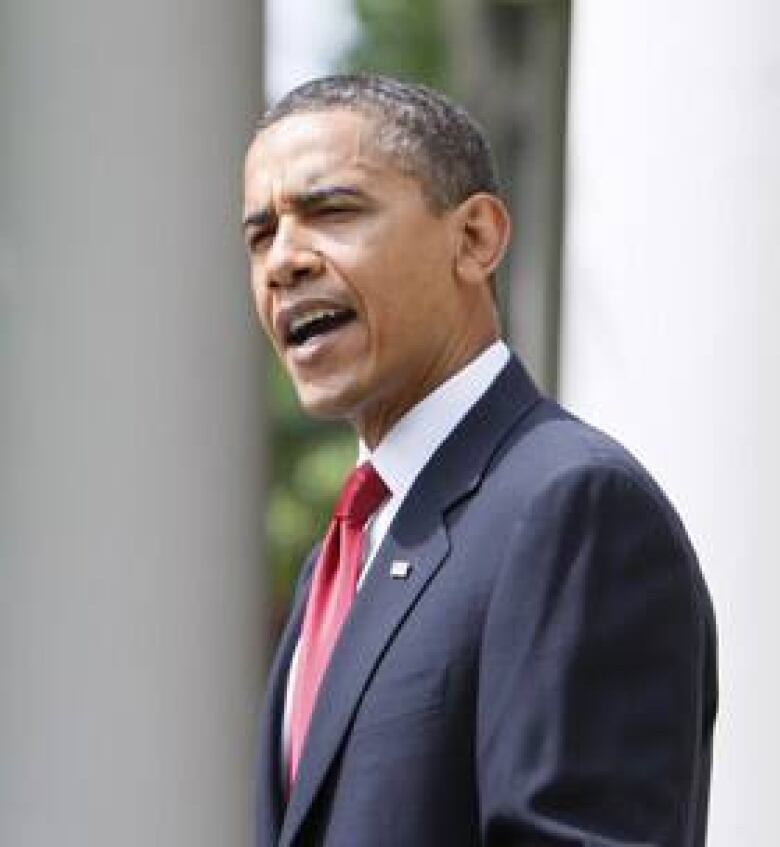UN Security Council condemns North Korea nuclear test
Harper calls test provocative, Gorbachev senses internal difficulty

The UN Security Council unanimously condemned North Korea's latest nuclear test on Monday as a clear violation of a resolution issued following Pyongyang's first atomic test in 2006.
The statement emerging from the 15-member council's emergency meeting in New York came after U.S. President Barack Obama urged the international community to "stand up to" North Korea and demand it abandon its nuclear program.
The Security Council statement said members would start work on a new resolution condemning Monday morning's test, which sparked immediate condemnation by world leaders as a threat to international security and in blatant defiance of international law.
The Security Council statement echoed comments earlier Monday by UN Secretary General Ban Ki-moon, who said he "strongly deplores" the latest test as a "clear and grave" violation of past resolutions.
Other world leaders were just as quick to condemn the move.
Obama said the nuclear test and the subsequent firing of three short-range missiles "pose a grave threat to the peace and security of the world and I strongly condemn [North Korea's] reckless action."
"North Korea will not find security and respect through threats and illegal weapons," the president told reporters on Monday morning in Washington. "We will work with our friends and allies to stand up to this behavior. The United States will never waver from our determination to protect our people and the peace and security of the world."
In Ottawa, Prime Minister Stephen Harper issued a statement condemning the test as reckless and provocative.
"North Korea's aggressive weapons programs represent a grave threat to international security, and are specifically troubling for stability in Northeast Asia," he said.
"We hope all international actors will join in denouncing the North Korean regime's nuclear test and its recent ballistic missile launch, " Harper added.
Similar size to Hiroshima bomb

North Korea's official KCNA news agency reported Monday that scientists had successfully conducted an underground nuclear test. It's the second successful test since 2006.
Russia's Defence Ministry later confirmed that a test occurred about 80 kilometres northwest of the city of Kilchu and estimated its yield at 10 to 20 kilotons, a size comparable to the bombs dropped on Hiroshima and Nagasaki at the end of the Second World War.
Some have speculated that the bold moves might be more aimed at consolidating domestic power than sending an international message.
"The fact that North Korea is undertaking this nuclear test amid great economic and political turmoil might be a sign that North Korea is trying to escape from some kind of internal difficulty," former Russian president Mikhail Gorbachev said during a visit to Seoul.
The U.S. State Department is still analyzing data from the alleged nuclear test. But the U.S. Geological Survey confirmed that a seismic event took place at about 9:50 a.m. local time in the northeast area of North Korea that was consistent with a test.
The Japan Meteorological Agency also measured the seismic activity at magnitude 5.3. Meanwhile, the Korea Institute of Geoscience and Mineral Resources in Seoul reported seismic activity in Kilju in North Hamgyong Province, the same area where North Korea carried out a nuclear test in October 2006.
Later in the day, North Korea reportedly launched the three short-range missiles.
China 'resolutely opposed' to test

In a written statement, China, the North's closest ally, also said it is "resolutely opposed" to the nuclear weapons test and urged North Korea to return to the six-nation process aimed at dismantling its nuclear program.
South Korea called the test a threat to world peace.
"We are seriously concerned about North Korea's second test of a nuclear device," said South Korean Foreign Minister Yu Myung-hwan. "It's a direct threat against the peace and stability in the region as well as the world."
Pyongyang has been engaged in years of on-off negotiations, which have been pressing the impoverished state to give up its nuclear ambitions in return for massive aid and an end to the country's pariah status.
North Korea announced in April that it was withdrawing from the six-nation disarmament talks and said it would restore partly disabled nuclear facilities.
Some analysts said Monday's test reflected North Korea's defiance in the face of criticism that it had launched a long-range rocket from a base on the country's northeast coast. North Korea said that was not a missile test, but a satellite launch.
Analysts believe North Korea has enough weaponized plutonium for at least six atomic bombs. However, experts say scientists have not yet mastered the miniaturization needed to mount a nuclear device onto a long-range missile.
With files from The Associated Press